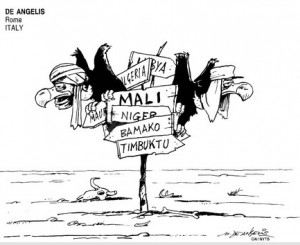Koffi Alle writes: Terrorism on the scale witnessed in Paris last month is nothing new in Africa. In Nigeria, Cameroon, Chad, and Niger, the extremist group Boko Haram – famous for its kidnapping of 276 school girls in 2014 – has inflicted thousands of casualties with suicide bombings and assaults on civilians. In Kenya, the Somali group Al-Shabaab has carried out two major attacks, on Nairobi’s Westgate shopping mall in 2013 and on Garissa University in 2015, as well as many smaller acts of terror.
Meanwhile in Tunisia, the Islamic State has targeted tourists – orchestrating attacks on a museum and a beach resort. And in Mali, shortly after the attacks in Paris, gunmen belonging to an Al Qaeda affiliate stormed the Radisson Blu hotel in Bamako, killing 22 people. Terror, it seems, has become part of the new normal in Africa.
These attacks, and others, have cast a dark shadow across the continent’s long-awaited economic rise. It is not difficult to see why. Terrorism risks derailing Africa’s economic and political development in six important ways.
For starters, there is the sheer scale of the humanitarian catastrophe. Since 2009, Boko Haram alone has killed more than 10,000 people in Nigeria and has driven nearly a half-million from their homes.
Second, terrorism is undermining GDP growth and weighing down overall economic performance in affected countries; the economy of northern Nigeria, for example, has been devastated by the ongoing violence.
Already, economic indicators in these countries have been revised downward after terrorist incidents.
Third, the fight against terrorism is sucking up scarce financial resources. Scaling up military missions is costly, and the unpredictability of terror strikes often requires extra spending on security, which sometimes causes governments to miss their fiscal targets.
In Central and West Africa, the fiscal pressure has been especially intense. In addition to the outlays required to equip the armed forces engaged against Boko Haram, Nigerian officials estimate that billions of dollars will be needed to rebuild ravaged infrastructure in the north. Similarly, Chad’s soldiers fought alongside French troops against terrorists in Mali, and now they have coalesced with those of Nigeria and Cameroon in fighting Boko Haram. In April, the country was granted $170 million in debt relief – the payoff for years of economic reform. But now it is being forced to use part of its hard-won fiscal space to finance the fight against terror.
Fourth, the countries at risk are among the most promising frontier markets. In Nigeria, which recently became Africa’s largest economy, a dynamic private sector has been diversifying an economy that has long been dominated by oil production.
Fifth, terrorism is undermining state building.
Finally, the risk that fighting terrorism poses to civil liberties is especially acute in Africa, where institution building is still an ongoing process.
Most of the civil conflicts that held back Africa’s development for decades have finally come to an end. But terrorism risks undermining the continent’s hard-won stability and strong GDP growth.

